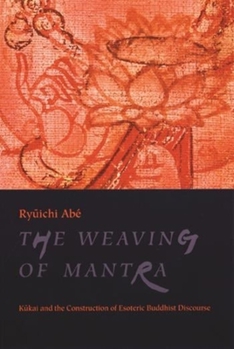The Weaving of Mantra: Kukai and the Construction of Esoteric Buddhist Discourse
Select Format
Select Condition 
Book Overview
The great Buddhist priest K kai (774-835) is credited with the introduction and establishment of tantric -or esoteric -Buddhism in early ninth-century Japan. In Ry ichi Ab examines this important religious figure -neglected in modern academic literature -and his profound influence on Japanese culture. Offering a radically new approach to the study of early religious history -combining historical research, discourse analysis, literary criticism, and semiology -Ab contends that the importance of K kai s transmission of esoteric Buddhism to Japan lay not in the foundation of a new sect but in his creation of a general theory of language grounded in the ritual speech of mantra. embeds K kai within the fabric of political and social life in ninth-century Japan and explains how esoteric Buddhism played a crucial role in many societal changes in Japan -from the growth of monasteries into major feudal powers to the formation of the native phonetic alphabet, kana. As Ab illustrates, K kai s writings and the new type of discourse they spawned also marked Japan s transition from the ancient order to the medieval world, replacing Confucianism as the ideology of the state. Ab begins by placing K kai s life in the historical context of medieval Japan and the Ritsuryo state, then explores his interaction with the Nara Buddhist intelligentsia, which was seminal to the introduction of esoteric Buddhism. The author discusses K kai s magnum opus, () and introduces a number of Japanese and Chinese primary-source texts previously unknown by Western-language scholars. Instead of tracing K kai s thought through literal readings, explores the rhetorical strategies K kai employed in his works, shedding valuable light on what his texts meant to his readers and what his goals were in creating a discourse that ultimately transformed Japanese culture.
The great Buddhist priest K kai (774-835) is credited with the introduction and establishment of tantric--or esoteric--Buddhism in early ninth-century Japan. In The Weaving of Mantra, Ry ichi Ab examines this important religious figure--neglected in modern academic literature--and his profound influence on Japanese culture. Offering a radically new approach to the study of early religious history--combining historical research, discourse analysis, literary criticism, and semiology--Ab contends that the importance of K kai's transmission of esoteric Buddhism to Japan lay not in the foundation of a new sect but in his creation of a general theory of language grounded in the ritual speech of mantra.





